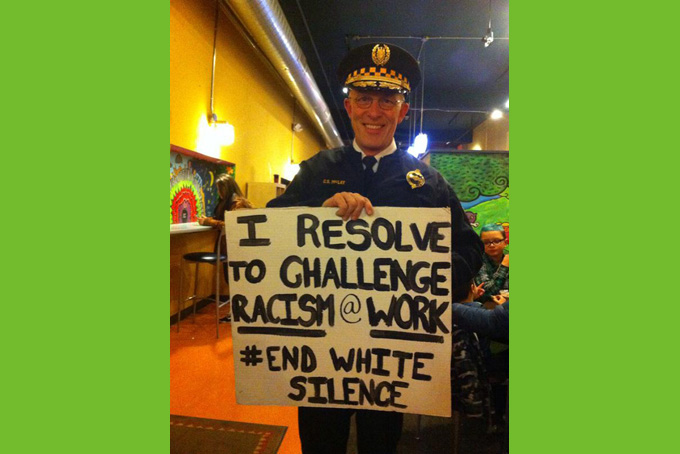
PITTSBURGH (AP) – Pittsburgh’s new police chief has asked for an internal investigation of himself to determine whether he broke police regulations by retweeting a picture that shows him holding a sign that said “I resolve to challenge racism @ work” and with the hash tag “end white silence.”
“If I’m going to talk about integrity of processes, it starts with me,” Chief Cameron McLay said Thursday after a news conference he called to address the city’s homicide rate.
McLay, who is White, has angered the city’s police union by posing with the sign at a New Year’s Eve city celebration in the wake of demonstrations in Pittsburgh and other cities nationwide over the killings of black men by white police in Missouri and New York City.
Mayor Bill Peduto, who hired McLay in September, said he was so pleased with the photo he posted it on his Facebook page. But Fraternal Order of Police Lodge No. 1 president Howard McQuillan said the sign paints city police as racists and violates a policy governing police participation in social media.
“I have very, very little concern that I’ve violated policies,” McLay said Thursday.
But he said he suspended his Twitter account and asked the Office of Municipal Investigations, which reviews alleged misconduct by any city employee, to investigate his tweet just in case it’s eventually determined his social media actions did violate policy. “I don’t want to keep doing it while I’m waiting for the (investigation) findings,” he said.
McLay’s latest comments come amid sparring with the union over policies in general and rules, in particular, on how officers interact with the media. He issued a statement Wednesday saying he’s requiring every one of the 900-plus officers in the city to sign a “memorandum of individual responsibility.”
The memo refers to the police bureau’s policy on who can speak with the media and what they can say about police investigations and on how to deal with emails and internal memos shared with unauthorized audiences. He said that before he became chief, the bureau was criticized for leaks that damaged the integrity of police investigations.
Asked Thursday about these leaks, McLay refused to provide any specifics.
Bryan Campbell, the FOP’s attorney, said in a telephone interview that the memo is so broad as to be incomprehensible, and doesn’t touch on anything already covered by the police media policy, adopted in 2000 and revised in 2012.
“The position of the FOP is there’s no need to fix it if it ain’t broke,” Campbell said.